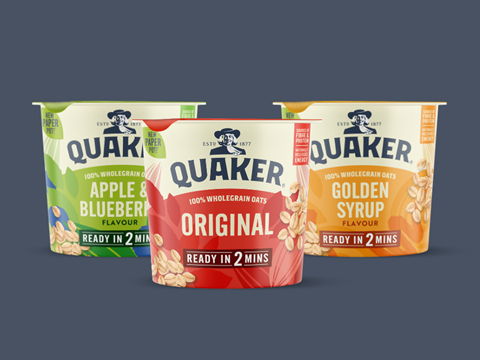
Quaker Oats aims to streamline recyclability and remove a yearly estimate of up to 200 tonnes of plastic by transitioning into paper packaging across its porridge pot range.
Although the previous pots were also recyclable, they required the removal of inner plastic packaging from a card sheath in order to be recycled. A transition into paper is hoped to benefit consumers by ensuring that the whole pack can enter the same recycling stream, thus simplifying its disposal.
It is hoped that the new packaging will cut down on the use of virgin plastic in porridge pots sold across the UK, with Quaker Oats thought to constitute up to 47% of the country’s porridge pot market.
“Quaker Oats was one of the first branded porridge pots on the market, so we’re proud to also be leading in packaging innovation and plastic reduction,” says Gareth Callan, sustainable packaging lead at parent company PepsiCo UK & Ireland. “We know convenience is a key factor in driving recycling rates, which is another important reason for launching this new packaging, and we’re pleased to be making it as easy as possible for Quaker fans to recycle their pots, wherever they are.”
This transition is the latest in a series of sustainability-minded repackaging efforts from PepsiCo in pursuit of its health and sustainability transformation plan, PepsiCo Positive. One of its ambitions is to reach net zero emissions by 2040.
PepsiCo’s Walkers crisps brand has trialled bagless multipacks for its Snack A Jacks range, and the paper-based outer packaging tested on its Walkers Baked six-pack multipacks has recently been launched across the full Walkers Baked range.
Meanwhile, UK retailer Tesco is currently the exclusive source of a 90% paper tube for Kellanova’s Pringles brand; and Upfield has launched an oil-resistant paper tub for its plant-based butters and spreads, seeing to eliminate over 25,000 tons of plastic waste every year.
If you liked this article, you might also enjoy:
The L’Oréal approach to packaging sustainability
The way we talk about plastic needs to change – here’s how to get it right
What steps is Apple taking to make its packaging more sustainable?














No comments yet